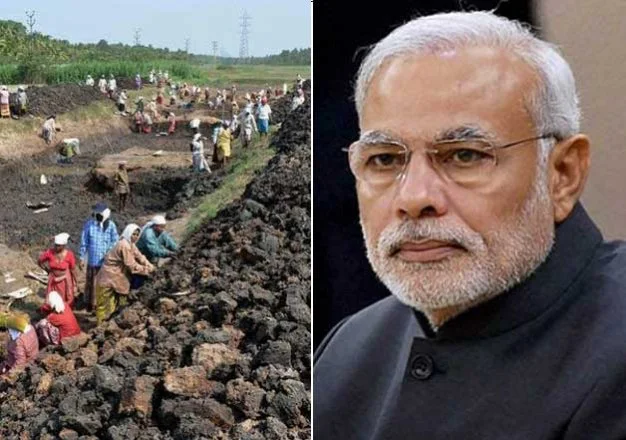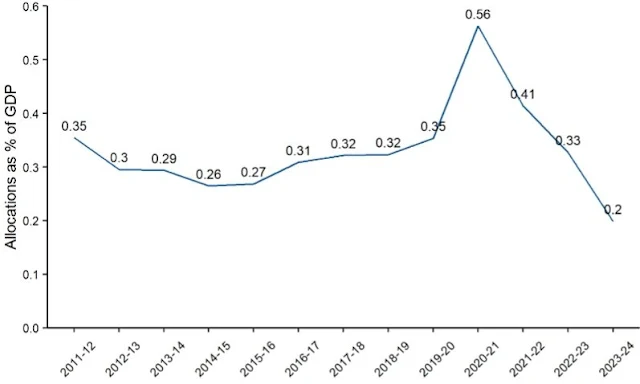Counterview Desk
Advocacy groups Peoples' Action for Employment Guarantee (PAEG) and NREGA Sangharsh Morcha (NSM) have said that considering the estimated pending liabilities of this current year, only Rs 50,600 crore will be remaining for expenditure for implementing the National Rural Employment Guarantee Act (NREGA). Consequently, they note, only 16.64 days of work per active household can be generated for FY 23-24.
“If we consider all 16 crore registered households (HHs), the days will further decrease to just 10 days. Additionally, the allocation for FY 2023-24 as a percentage of the GDP is around 0.198% which is the lowest ever in the history of NREGA. This unjust allocation by the Modi government is an assault on rights of rural workers and is a step towards killing the programme”, they said in a statement.
“NREGA workers and their supporters from across the country will gather in Delhi to protest for 100 days starting from February 6 under the banner of NREGA Sangharsh Morcha.”, they warned.
According to the Periodic Labour Force Survey (PLFS) 2020-21, the overall rural unemployment in India is 6.48%. As per World Bank data, women’s labour force participation in India has declined and four out of five women were not in the labour force in 2021.
World Bank recommended that at least 1.7 per cent of the GDP must be allocated for the programme (see: Rinku Murgai and Martin Ravallion, ‘Employment Guarantee in Rural India: What Would It Cost and How Much Would It Reduce Poverty?’. Economic and Political Weekly 40, no. 31, 2005, pp. 3450–55).
Advocacy groups Peoples' Action for Employment Guarantee (PAEG) and NREGA Sangharsh Morcha (NSM) have said that considering the estimated pending liabilities of this current year, only Rs 50,600 crore will be remaining for expenditure for implementing the National Rural Employment Guarantee Act (NREGA). Consequently, they note, only 16.64 days of work per active household can be generated for FY 23-24.
“If we consider all 16 crore registered households (HHs), the days will further decrease to just 10 days. Additionally, the allocation for FY 2023-24 as a percentage of the GDP is around 0.198% which is the lowest ever in the history of NREGA. This unjust allocation by the Modi government is an assault on rights of rural workers and is a step towards killing the programme”, they said in a statement.
“NREGA workers and their supporters from across the country will gather in Delhi to protest for 100 days starting from February 6 under the banner of NREGA Sangharsh Morcha.”, they warned.
Text:
The allocation for NREGA announced in the budget for FY 2023-24 is a travesty and is an assault on the peoples’ right to work as mandated under the National Rural Employment Guarantee Act. NREGA is a demand driven law and demand for work must be satisfied. The unprecedented budget cut will lead to (a) massive delays in wage payments, (b) suppression of work demand, and (c) lack of quality assets getting created. Instead of adequately funding the programme, the Union government has repeatedly resorted to needless technical tinkering. The National Mobile Monitoring System (NMMS) application for capturing workers’ attendance, mandated in the current FY, is one such anti-worker intervention.According to the Periodic Labour Force Survey (PLFS) 2020-21, the overall rural unemployment in India is 6.48%. As per World Bank data, women’s labour force participation in India has declined and four out of five women were not in the labour force in 2021.
Stagnation of rural wages is another key concern. Between 2014 and 2021, increase in real rural wages has been sluggish with an increase of just Rs. 29. These statistics clearly indicate the distress being faced by the unemployed, particularly the informal sector. Low levels of employment and low wages also lead to low consumption which in turn adversely impacts economic growth by reducing bottom-up aggregate demand.
In spite of the programme functioning at half its capacity (average number of days worked per household have only been between 40 and 50 days over the past 5 years3), it has had far-reaching impacts.
In spite of the programme functioning at half its capacity (average number of days worked per household have only been between 40 and 50 days over the past 5 years3), it has had far-reaching impacts.
A recent study showed that 20-60% of households in Bihar, Karnataka, Madhya Pradesh and Maharashtra felt that NREGA contributed to overall development of the village and not having to migrate was frequently mentioned as the positive aspect of the programme.
As the most resounding referendum for NREGA, more than 8 out 10 job card holders in the surveyed blocks said that they want NREGA to have 100 days of individual entitlement instead of 100 days of household entitlement.
NREGA has clearly shown its relevance in this context, particularly through the pandemic and the subsequent lockdown. Research (see: Desai, Vashihstha, and Joshi 2015) has also shown that assets created under NREGA can be ecologically beneficial to the local community and geography.
Throughout the last decade including the pandemic, women’s persondays in NREGA continued to be more than half of the total persondays generated. FY 2022-23 also saw women’s contribution to total persondays at 57%, one of the highest ever (Source: NREGA MIS ‘At a Glance’, accessed 2 February, 2023).
Instead of building on the tentative gains made over the past two years, the Union government, through the budget cut announced yesterday, makes the social security of 10.02 crore active workers more precarious than before.
The budgetary allocation for FY 2023-24 has been reduced to Rs. 60,00 crore, despite revised estimates for the current financial year coming in at Rs 89,400 crore. In our pre-budget note we recommended that Rs.2.72 lakh crore will be needed to provide legally guaranteed 100 days of work for at least all those who worked in the current FY.
This amounts only to around 1% of the GDP and is in fact a conservative estimate that considers only households that were employed this (a mere 56.56% of the total active job cards as on January 24, 2023) at the estimated minimum wage rate. Fig. 1 shows NREGA allocation as a percentage of GDP over the years.The budgetary allocation for FY 2023-24 has been reduced to Rs. 60,00 crore, despite revised estimates for the current financial year coming in at Rs 89,400 crore. In our pre-budget note we recommended that Rs.2.72 lakh crore will be needed to provide legally guaranteed 100 days of work for at least all those who worked in the current FY.
World Bank recommended that at least 1.7 per cent of the GDP must be allocated for the programme (see: Rinku Murgai and Martin Ravallion, ‘Employment Guarantee in Rural India: What Would It Cost and How Much Would It Reduce Poverty?’. Economic and Political Weekly 40, no. 31, 2005, pp. 3450–55).
On the contrary, the allocation for FY 2023-24 as a percentage of the GDP (the nominal GDP for BE 2023-24 has been projected at 3,01,75,065 crores) is around 0.198% which is the lowest ever in the history of NREGA (since 2008, when NREGA was extended to the whole country).
As of now 8.1 crore workers from 5.7 crore households have worked in NREGA this FY despite frequent interruptions in implementation due to long delays in fund release from the Centre. The budget estimate for FY 23-24 is even lower if arrears are deducted.
Considering the estimated data (see figure below) NREGA budget allocation as a percentage of GDP pending liabilities of this current year, only Rs. 50,600 crores will be remaining for (Annexure_PostBudget_FY23-24). Consequently, only 16.64 days of work per active household (considering 10.02 crore active job card holders as per NREGA NIC report) can be generated for FY 23-24.
If we consider all 16 crore registered HHs, the days will further decrease to just 10 days. Naveen Patnaik, Chief Minister of Odisha, amongst other political leaders is also dismayed at the budget cut. This unjust allocation by the Modi government is an assault on rights of rural workers and is a step towards killing the programme.
If we consider all 16 crore registered HHs, the days will further decrease to just 10 days. Naveen Patnaik, Chief Minister of Odisha, amongst other political leaders is also dismayed at the budget cut. This unjust allocation by the Modi government is an assault on rights of rural workers and is a step towards killing the programme.
The cutting down of NREGA’s budget allocation must also be recognized relative to the increase in the budgetary outlay of PMAY and Jal Jeevan Mission. This is instructive of the Government’s intent to weaken legislations that empower workers, and instead promote schemes that leave citizens to the mercy of yearly allocations and targets.
NREGA Sangharsh Morcha and Peoples' Action for Employment Guarantee express our deep disappointment at this grossly inadequate allocation for NREGA. The current regime continues to shrink workers’ rights in form of delayed wage payments, excessive digitisation and centralisation of the programme, as well as changes introduced with no worker-consultation.
In response, NREGA workers around the country hit the road on NREGA Diwas (February 2) to protest against budget cuts. To put an end to the systematic undermining of the Act and to expose the central government’s lack of commitment to workers rights’, hundreds of NREGA workers and their supporters from across the country will gather in Delhi to protest for 100 days starting from 6th February under the banner of NREGA Sangharsh Morcha.




Comments